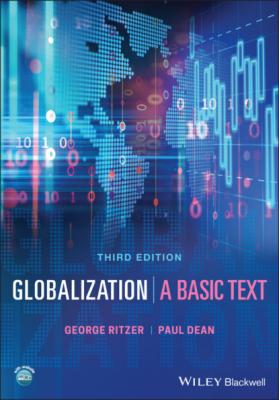Globalization. George Ritzer
Чтение книги онлайн.
Читать онлайн книгу Globalization - George Ritzer страница 24
 Elhanan. 2018. Globalization and Inequality. Cambridge, MA: Harvard University Press.
Elhanan. 2018. Globalization and Inequality. Cambridge, MA: Harvard University Press.9 Jones, Reece, and Corey Johnson, eds. 2016. Placing the Border in Everyday Life. New York: Routledge.
10 Kershaw, Ian. 2019. The Global Age: Europe 1950–2017. New York: Viking Press.
11 Lechner, Frank, and John Boli. 2019. The Globalization Reader, 6th ed. Malden, MA: Wiley-Blackwell.
12 Ritzer, George, ed. 2007. Blackwell Companion to Globalization. Oxford: Blackwell.
13 Ritzer, George, ed. 2012. Wiley-Blackwell Encyclopedia of Globalization. Oxford: Wiley-Blackwell.
14 Ritzer, George, and Paul Dean. 2019. Globalization: The Essentials, 2nd ed. Malden, MA: Wiley-Blackwell.
NOTES
1 1 The French call this mondialization. See, for example, Ortiz (2006). However, as is clear from his book’s title, Jean-Luc Nancy (2007) distinguishes between mondialization, defined as the open creation of the world, and globalization which is seen as a more closed and integrated process.
2 2 The term “social” here and elsewhere in his book is used very broadly to encompass social process in various sectors – political, economic, social, etc.
3 3 It should be noted that while the concept of globalization, if not this particular definition, is now very familiar to all of us, it is actually of very recent vintage. Chanda (2007: 246) reviewed an electronic database that archives 8,000 sources throughout the world (newspapers, magazines, reports). He does not find a reference to globalization until 1979 and then only in an obscure European administrative document. By 1981 there are still only two mentions of the term globalization, but then such references take off reaching over 57,000 in 2001. Interestingly the number drops off after that, but subsequently rose once again.
4 4 This definition requires several amplifications or clarifications. First, the idea that globalization is planetary is derived from Scholte (2005). Second, while globalization is planetary, little traverses the entire planet. The latter is the outer limit of globalization, but it is rarely approached. Third, the definition as a whole seems to imply a “grand narrative” of increasing globalization, but it is recognized that globalization occurred on a far more limited scale at earlier points in history (see Chapter 2) and that the changes described here are often uneven and that in some cases (e.g. in the case of immigrants, see below) there was greater liquidity, things flowed more easily, in earlier epochs. Fourth, it should be pointed out that not all of the phenomena mentioned in this definition are equally liquid or flow to the same degree. Clearly, communication is the most liquid and flows the most easily; places and people are far less liquid and their flow is much more limited. However, places are much more likely now than in the past to flow around the world as represented by the global presence of many fast food restaurants and other chains. In some senses, people (e.g. as immigrants) moved more easily in the late nineteenth and early twentieth century when nation-states had far fewer restrictions on immigration than they do today (but those restrictions have increased greatly recently). However, overall people today are more liquid and flow more easily globally as, for example, tourists, business travelers, and the like, and even as immigrants, at least in some senses (e.g. the flow is much more multidirectional than it was in that earlier epoch). It is even more the case that social relationships are more liquid, and flow more easily, than they did in the past. Fifth, Tomlinson (2007: 352) offers a definition of globalization that has much of the flavor of the perspective being offered here: “complex, accelerating, integrating process of global connectivity … rapidly developing and ever-densening network of interconnections and interdependencies that characterize material, social, economic and cultural life in the modern world”; another definition emphasizing flows, interconnectedness, and also barriers can be found in Yergin and Stanislaw (1998: 383).
5 5 In addition to “flow” Chanda (2007) uses terms like “flowing,” “water,” “ripples,” and “waves” in discussing globalization. “Tracking Global Flows” is the title of Inda and Rosaldo’s (2008) Introduction to an anthology of work in anthropology on globalization, and flows is the organizing principle of that book. The five substantive sections of that book deal with the flow of capital, people, commodities, the media, and ideologies. Paul Gilroy (1993: 190) often uses images of ships and sea voyages in his discussion of global “flows.” See also Ong (2006).
6 6 Although, contrary to US propaganda, al-Qaeda did not have much of a role, if any, in Iraq.
7 7 While this discussion will focus on structures, it is clear that structures are created, run, and staffed by human agents who direct their operations. This is in line with the general tendency in social theory to be concerned with the relationship between structure and agency. See Ritzer and Stepnisky (2017).
CHAPTER 2 GLOBALIZATION II SOME BASIC ISSUES, DEBATES, AND CONTROVERSIES1
Is There Such a Thing as Globalization?
Is it Globalization, Transnationalization, or Regionalization?
If There is Such a Thing as Globalization, When did it Begin?